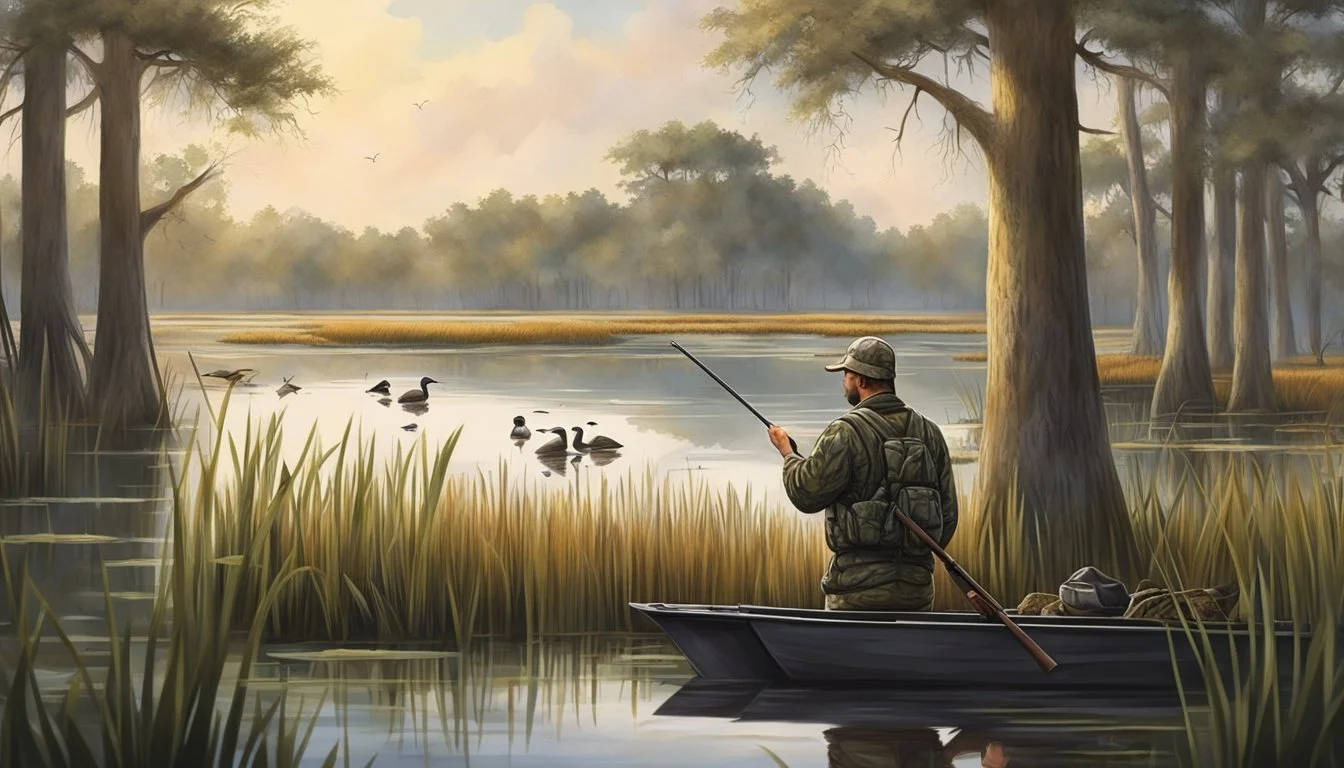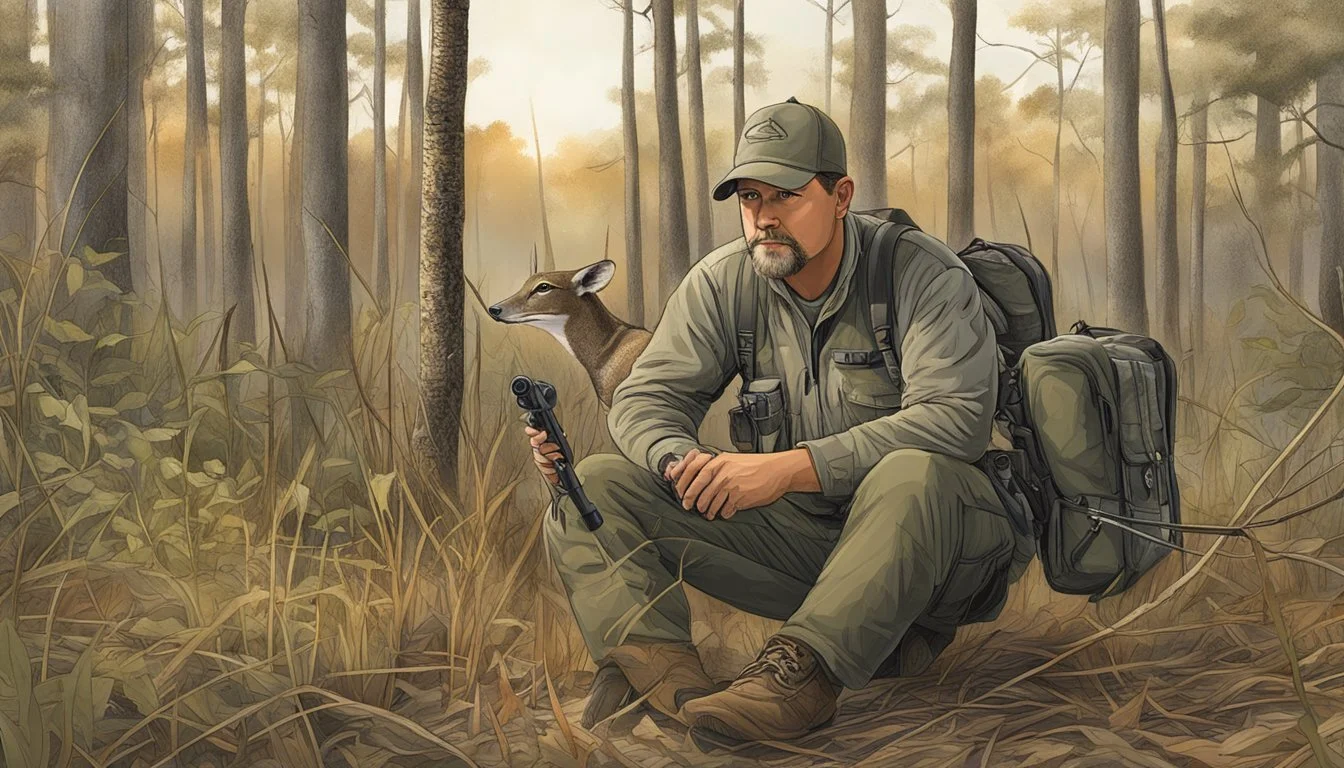Hunting Leases Louisiana
Your Guide to Prime Locations & Contracts
Louisiana, rich in biodiversity and natural landscapes, offers an array of opportunities for hunting enthusiasts. The state's hunting leases provide access to a variety of habitats where hunters can pursue game species in accordance with regional regulations. These leases are available on private lands, which are managed to ensure sustainable wildlife populations and often include quality habitats for species such as deer, waterfowl, and small game.
Hunting leases in Louisiana cater to a range of preferences, from smaller acreages suitable for individual hunters to larger areas ideal for groups. Whether it's a tract beset by hardwood ridges or rice (how long does rice last?) fields that attract flocks of ducks, (What wine goes well with duck?) these properties are tailored to enhance the hunting experience. As a form of recreational use, hunting leases also contribute to the local economy and encourage responsible land and wildlife management.
Interested parties seeking hunting leases in Louisiana can explore options through various online platforms and services. These resources compile extensive listings with detailed information on location, acreage, and available game. Additionally, aerial mapping and fully researched lands assist in the decision-making process, ensuring hunters can secure their ideal hunting ground in the Sportsman's Paradise of the South.
Understanding Hunting Leases in Louisiana
Hunting leases in Louisiana offer hunters access to private lands where they can pursue a variety of game species. These leases are agreements that grant hunting rights on private property for a specified period of time.
Types of Hunting Leases
In Louisiana, hunting leases can be broadly categorized into two types: seasonal and year-round leases. Seasonal leases are tailored to specific game seasons, such as deer or duck, providing access during peak hunting times. Year-round leases allow for more flexibility, offering the opportunity to hunt various game species across multiple seasons.
Lease Contract Essentials
When entering into a lease contract, there are several essential elements that should be clearly defined:
Duration: The time frame of the lease must be specified.
Cost: This should detail the price range and payment structure.
Hunting Rights: Clarity on what types of game can be hunted and any restrictions.
Property Boundaries: The contract should outline the exact area included in the lease.
Liability: Terms defining the responsibilities for both the lessor and the lessee.
Common Game Species
Louisiana is rich with diverse game species, making it a prime location for various types of hunting. Some of the common game included in hunting leases are:
Deer: High in demand, deer hunting is a prominent activity on leased lands.
Duck: The state's wetlands offer ideal habitats for duck hunting.
Small Game: Species such as squirrels and rabbits are also popular among hunters.
Hunting leases in Louisiana serve as an essential part of the state's hunting infrastructure, supporting conservation efforts and providing controlled access to private land.
Finding the Right Property
Choosing the right hunting lease in Louisiana requires consideration of the availability of leases, the characteristics of the land, and ease of access. Ensuring these aspects align with the hunter's needs is critical for a satisfactory hunting experience.
Available Leases
Louisiana offers a diverse array of hunting leases across its East and West regions. Prospective lessees can find options ranging from wetlands rich in waterfowl in the East to mixed hardwood and swampy areas in the West.
East Louisiana: Known for its wetlands, providing excellent duck hunting opportunities.
West Louisiana: Offers a mix of terrains, including ridges and bottomlands for a variety of game.
Evaluating Land Features
When assessing potential hunting leases, one should scrutinize the specific features of the land, which influence game abundance and hunting success.
Land Features to Evaluate:
Habitat type (e.g., hardwood ridges, creek bottoms, swampy areas)
Presence of water sources
Signs of prevalent game (tracks, droppings)
Access Considerations
Reliable access to the hunting lease is vital. Hunters should verify the easiness of ingress to ensure that they can enter and exit the property safely and conveniently.
Considerations for Access:
Proximity to public roads or highways
Legality of established access points
Potential obstructions or challenges (e.g., crossing wetlands)
Lease Management
In managing hunting leases in Louisiana, leaseholders and landowners focus on enhancing the habitat, ensuring accessibility, and upholding safety. These efforts benefit both the wildlife and the hunters who use the land.
Developing Food Plots
Food plots are strategic areas set aside and cultivated with specific crops to attract and nourish wildlife. Leaseholders often work with landowners to select appropriate crops that will thrive in Louisiana's climate, ensuring a year-round food source for game such as deer and turkeys. These plots not only support healthy wildlife populations but also increase hunting opportunities.
Key Crops for Louisiana:
Summer: Cowpeas, Soybeans, (how long do soybeans last?) Sunflowers
Winter: Clovers, Oats (how long do oats last?), Wheat
Maintaining Roads and Pipelines
Access to the leased land is crucial for both management activities and hunting. Leaseholders are responsible for the upkeep of roads and trails to ensure safe and unobstructed access for vehicles and equipment. Additionally, the maintenance of pipelines, often used as linear clearings, is vital as they often serve dual purposes for access and as wildlife corridors.
Maintenance Tasks Include:
Regular grading and filling of potholes on roads
Clearing vegetation and debris from pipelines
Implementing Safety Measures
Leaseholders prioritize safety measures to protect all parties involved, including hunters and landowners. This includes setting clear hunting guidelines, defining shooting ranges, and ensuring the proper use of tree stands and blinds. Keeping hunting zones well-marked and providing information on first-aid and emergency procedures are part of a comprehensive safety plan.
Safety Protocols:
Mandatory wearing of safety orange during designated seasons
Clear signage denoting hunting areas and restricted zones
Wildlife and Habitat
Louisiana's hunting leases offer rich habitats that support a diverse array of wildlife. They include both native and non-native animal species and provide ideal conditions for hunting. Effective habitat preservation measures and knowledge of seasonal considerations are essential for a sustainable hunting experience.
Native and Non-Native Species
Louisiana hosts an assortment of game species across its varied landscapes. Whitetail deer are prevalent and a favorite among hunters. Non-native species such as axis deer have also been introduced and thrive in the state's environments. Other game includes wild boar, quail, and native waterfowl, which are particularly prominent.
Native Wildlife:
Whitetail deer
Waterfowl
Wild boar
Non-Native Wildlife:
Axis deer
Fallow deer
Blackbuck
Habitat Preservation
The state emphasizes the importance of conserving the natural habitats to maintain ecological balance and support wildlife populations. Various habitat types, from marshes and coastal wetlands to forests and bayous, are carefully managed. This includes public hunting lands where hunting activities are often regulated to prevent overharvesting and to assist natural re-growth and regeneration.
Key Habitats:
Marshes and wetlands
Wooded forests
Coastal bayous
Seasonal Considerations
Hunters must be mindful of Louisiana's seasons, which can influence animal behavior and habitat conditions. Waterfowl hunting, for instance, peaks when waterfowl migrate to escape the harsh northern winters. Hunting leases may set specific dates and rules to align with these movements and ensure that hunting activities do not negatively impact the species' life cycles.
Key Seasonal Movements:
Waterfowl migration
Breeding seasons
Feeding patterns
Specialized Hunting Opportunities
Louisiana offers a range of specialized hunting opportunities that cater to hunters looking for unique experiences. From stalking exotic game to embarking on traditional waterfowl hunts, the state boasts a diversity of wildlife that provides a plethora of specialized hunts.
Exotic Game Hunts
Louisiana's private lands often host hunts targeting exotic species such as axis deer, fallow, blackbuck, and the challenging wild boar. Hunters can find leases like the ones mentioned in the search results, for instance, Wild Hog Ridge Hunting Club, which offers custom-tailored hunts for large Russian and Razorback hogs. This niche of hunting promises a unique challenge and the opportunity to pursue game normally not found in the American wild.
Alligator and Waterfowl
The state's rich wetlands are perfect for alligator hunting, a highly regulated but rewarding experience. Similarly, waterfowl hunting leases are abundant in Louisiana, with species like mallards and various puddle ducks. Leases often provide access to duck hunting land optimized for these species, offering both guided and solo adventures. Hunters can participate in established traditions that are as much a part of Louisiana's culture as they are a sport.
Small Game Adventures
For those interested in small game, Louisiana's varied habitats support a diverse range of species. Hunters can target smaller game such as rabbits and squirrels, providing an engaging hunting experience suitable for all ages and skill levels. Small game hunting is widely available across the state, offering a more accessible entry point for novice hunters and a beloved pastime for experienced sportsmen.
Facilities and Clubs
Louisiana offers a variety of hunting facilities and clubs that cater to both seasoned hunters and those new to the sport. These entities often provide tailored experiences such as guided tours and curated game resources, ensuring a memorable and successful outing.
Hunt Clubs and Resorts
Dream Hunt Resort is recognized for its exceptional guided hunting services, offering an expansive selection of game resources on their property. Hunters can experience a satisfying hunt across various terrains that the resort meticulously maintains.
Wild Hog Ridge Hunting Club places a special focus on wild hog hunting, offering leases across lands rich in wildlife. Members benefit from the club's extensive knowledge of hog habitats, increasing their chances of a successful hunt.
Fishing and Mixed-Use Leases
Cutter Creek Outfitters provides a well-rounded experience with mixed-use leases that include both fishing and hunting opportunities. Their lands boast populations of deer, waterfowl, and fish, catering to a wide array of outdoor enthusiasts.
Land of Lakes Plantation and Bayou Teche Hunting Preserve offer leases that incorporate both duck hunting and fishing in rice fields and waterways. These locations are known for their biodiversity, making them prime spots for a variety of sporting activities.
Big Woods Fish and Game Reserve secures its reputation by preserving the natural balance while allowing hunting and fishing. Their stewardship results in a sustainable environment where game thrives, benefiting both the ecosystem and the sportsmen.
Legal and Ethical Considerations
In Louisiana, hunting leases are governed by specific regulations that ensure the safety of both the land and hunters. Lessees are expected to adhere to conservation practices and legal requirements that sustain the ecosystem and recreational quality of the land.
Regulations and Compliance
Louisiana Hunting: It is essential for individuals engaged in Louisiana hunting to follow state regulations, including season dates and bag limits. They should obtain all necessary certifications and adhere to the guidelines set forth by the Louisiana Department of Wildlife and Fisheries.
Hunting Lease Agreement: A fundamental part of entering a hunting lease in Louisiana is ensuring the agreement complies with state laws. The lease should define:
Clause Importance Duration Specifies the term of the lease Hunting Rights Outlines what species can be hunted and the methods allowed Payment Terms Details the fees per acre or terms of payment
Gates and Access: The lease agreement should specify who has access to the property and how gates should be managed to maintain security and prevent unauthorized entry.
FAQs: Frequently asked questions regarding the legal aspects of hunting leases should be addressed in the lease document or through resources provided by the lessor.
Responsible Hunting Practices
Recreational Leases: Lessees participating in recreational leases, such as hunting leases, are encouraged to engage in ethical hunting practices that reflect respect for wildlife and habitat conservation.
Conservation Initiatives: Ethical considerations are crucial and may include clauses in the lease that promote sound land management and avoid overharvesting of game species.
Safety Measures: Hunters must adhere to safety protocols to prevent accidents on the property. These include but are not limited to proper firearm handling and wearing high-visibility clothing during appropriate seasons.
Additional Resources
In the realm of Louisiana hunting leases, several additional resources stand out for providing comprehensive information and services. Those interested in detailed FAQs and seasoned professional guidance will find these offerings particularly useful.
FAQs and Information
Prospective lessors and lessees often seek out information to navigate the process of securing a hunting lease in Louisiana. RoyOMartin provides an accessible portal where individuals can find new leasing opportunities and pertinent details about each tract. They deliver a transparent experience with steps clearly outlined for ease of use. Additionally, websites like Foggy Trail serve as informative platforms where users can find frequently asked questions (FAQs) addressing common concerns and procedural aspects related to hunting leases.
Professional Outfitters and Guides
For hunters preferring a structured experience with expert guidance, professional outfitters and guides are indispensable resources. Arcadian Expeditions offers tailored hunting trips, with expert guides to facilitate a fulfilling hunting experience. These professionals ensure compliance with state regulations and focus on providing a successful and ethical hunting venture. Outfitters usually include all necessary amenities and take care of the logistics, making the hunting trip convenient and hassle-free for hunters of all levels.
Conclusion
Louisiana offers a diverse array of hunting opportunities that attract enthusiasts seeking recreational leases each year. The state's rich ecosystems and favorable habitat conditions create an ideal environment for various game species, making it a sought-after destination for hunters.
Hunting Leases in Louisiana
Private Lands: Provide enhanced chances for a successful hunt due to better management and restricted access.
Public vs. Private: While public lands are widely available, private leases offer quieter environments with less competition.
Cost: Access to private land comes with a price, tailored to cater to a range of budgets.
Choosing a Lease
Hunters should consider factors such as location, game species available, and the lease terms before committing.
It is beneficial to familiarize oneself with the specific regulations that apply to hunting areas within the state.
Benefits of Hunting Leases
They often lead to higher quality hunting experiences due to responsible management.
Leases can provide a means of controlling wildlife populations, thereby supporting conservation efforts.
Louisiana's hunting leases serve as a crucial component of the state's outdoor recreational offerings. They contribute positively to the economy and the conservation of wildlife. Hunters utilizing these leases are advised to operate within the state's regulations to ensure a sustainable balance between the sport and wildlife preservation.







